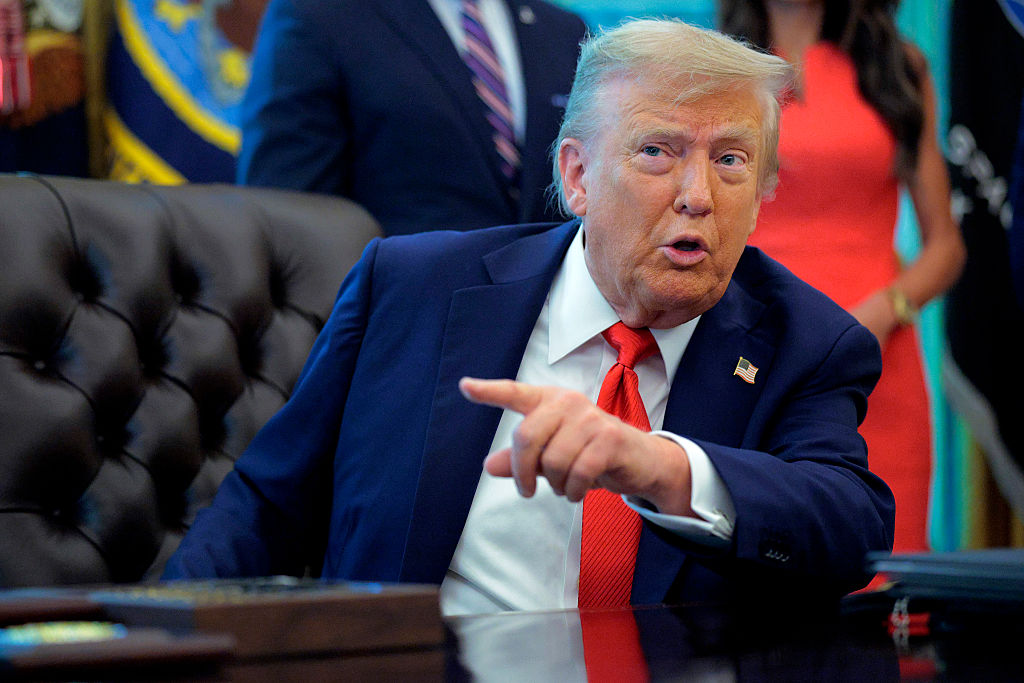President Donald Trump on Sunday signaled his support for the Federal Communications Commission (FCC) revoking ABC and NBC News’ broadcasting licenses, calling the media outlets an “arm of the Democratic Party.” But press freedoms and laws governing the FCC would hamper any effort to carry out the threat.
[time-brightcove not-tgx=”true”]
“Why is it that ABC and NBC FAKE NEWS, two of the absolute worst and most biased networks anywhere in the World, aren’t paying Millions of Dollars a year in LICENSE FEES,” the President wrote on Truth Social, after asserting the outlets pose a “threat to our democracy.”
“They should lose their Licenses for their unfair coverage of Republicans and/or Conservatives, but at a minimum, they should pay up BIG for having the privilege of using the most valuable airwaves anywhere at anytime!!!”
The FCC only licenses “individual broadcast systems,” however, not networks such as ABC and NBC, as the agency notes. The FCC is also barred under the First Amendment and the federal law that created the agency from dictating what programming networks air.
Broadcast stations can violate FCC rules if they knowingly publish false information which then results in “substantial public harm” that was “foreseeable,” or if direct evidence shows them intentionally “rigging or slanting” the news, the agency says. But the FCC also generally does not engage with complaints alleging“one-sided news reports or comments,” it says, because doing so would be “inconsistent with the First Amendment to replace the journalistic judgment of licensees with our own.”
The President’s recent comments add to his previous calls for networks to lose their broadcast licenses—including both ABC and NBC. Past heads of the agency have pushed back on those threats and emphasized the limits of the FCC’s authority.
“Under the law, the FCC does not have the authority to revoke a license of a broadcast station based on the content of a particular newscast,” then-agency Chair Ajit Pai said in 2017, after Trump suggested challenging NBC’s license over a report regarding the President’s relationship with his national security advisers.
“As I’ve said before, the First Amendment is a cornerstone of our democracy. The FCC does not and will not revoke licenses for broadcast stations simply because a political candidate disagrees with or dislikes content or coverage,” then-Chair Jessica Rosenworcel said last year, after Trump indicated CBS News should lose its license over its editing of a “60 Minutes” interview with 2024 Democratic presidential candidate Kamala Harris.
“While repeated attacks against broadcast stations by the former President may now be familiar, these threats against free speech are serious and should not be ignored,” Rosenworcel warned at the time.
Current FCC Chair Brendan Carr, who proposed moves to reshape the agency in conservative policy playbook Project 2025, has in contrast supported Trump’s call for the revocation of the three major broadcast networks’ licenses. Carr also criticized NBC for having Harris on Saturday Night Live days before the 2024 election, pointing to the requirement for media outlets to provide presidential candidates with the opportunity for equal air time under federal law.
Trump’s threats to networks’ licenses have come alongside broader attacks on the media by the President and his allies. Last year, Trump sued ABC News and anchor George Stephanopoulos after Stephanopoulos made an inaccurate statement about the verdict of a civil lawsuit against Trump. The media company agreed in December to pay $15 million toward Trump’s presidential library to settle the suit. Paramount, CBS’s parent company, more recently reached its own $16 million settlement with Trump in his lawsuit over the editing of the “60 Minutes” interview.
The agreements have sparked concern from media organizations, and legal experts told TIME in the wake of Paramount’s decision to settle with Trump that such cases could fuel a decline in the U.S.’s press freedoms and lead to self-censorship in newsrooms.
Trump has since sued multiple entities associated with the Wall Street Journal after it published an article alleging he sent a birthday letter to the late sex offender Jeffrey Epstein in 2003, and barred a Journal reporter from Air Force One for an international trip.
Public media has been subject to recent attacks as well. Earlier this month, the Corporation for Public Broadcasting, which helps fund NPR and PBS, announced that it would start shutting down in response to a law passed by Congress and signed by Trump rescinding $1.1 billion of its funding.

